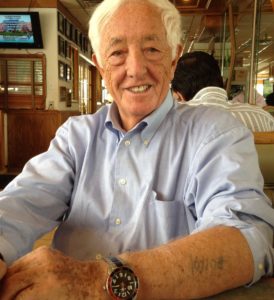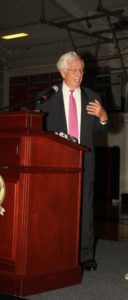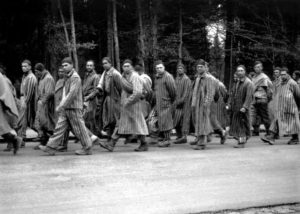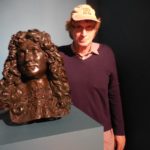Murray: My Moments with a Holocaust Survivor by Calvin Schwartz August 28, 2018

Murray Goldfinger
The title has ‘moments’ because there just wasn’t enough time with Murray Goldfinger. The last seven years as a journalist, novelist, broadcaster at NJ Discover afforded a myriad of opportunities to meet an endless array of memorable, fascinating people. Murray was instantly indelible, unforgettable, heart-wrenching, precious, and hauntingly special. The day we met in January, I brought my wife on the interview because her father, like Murray, was born in Poland before THE war.
Backtrack; how did I get to Murray? Last October, 2017 at a Rutgers football tailgate with my son Neil, Professor Deborah Shuford introduced me as a journalist to several people. A woman mentioned, “You should interview my father, Murray, 91, a holocaust survivor with an amazing story. He still lectures at schools, churches, synagogues.” Something was inside me. A few days later, I began the process to meet Murray. Not easy. He’s busy. Several appointments made, cancelled, doctored, snowed and iced out. Suddenly, it’s January.
A cold late afternoon in Monroe, New Jersey; a vast land of senior citizen developments, homes, cold empty golf courses; Murray opens the door. We’re greeted by a tall, white haired, somewhat frail smiling man with this twinkle in his eye. The twinkle lasted for nearly three hours, briefly interrupted by a few tears and apologies for such. How can I accurately describe the feeling of sitting next to him and listening to the horrors of his life experiences in the Holocaust; losing his eight brothers and sisters, parents and grandfather, all murdered by the Nazi’s, yet, at the appropriate times of our talk, he was filled with warmth, love, twinkling eyes, reverence, gratitude and unlimited pride when it came to talking about his family.

Interviewing Murray in January
My wife and I talked in the car all the way home; how Murray resonated, filled our senses with something unfelt before. A special loving sensitive brilliant gentle man, human; a great representative of our species. Now for elements of his life. There is so much out there on Google, You Tube, internet for you all to avail. My job here is to capture essences that moved me.
The town where he was from in Poland; his family had lived there for over 350 years. Just four Jewish families. Always anti-Semitism there. The Germans arrived when Murray was 13. No one expected things to get bad. In March, 1940, his family was forced to leave their home and move to another town where there was a restricted area. “At age 13, I was supposed to wear an armband, but I didn’t. I didn’t look Jewish…. then once, Germans were looking for me, so I hid in a tree.”
“From April and May, 1942, the Gestapo went on a shooting spree, killing Jews where ever they found them. One Gestapo went into a house with a woman and little baby. He started to cry. It must’ve reminded him about his home. He didn’t shoot them. His superior came in and asked why he didn’t shoot them. He said, “I can’t.” His superior said, “Either you do or I shoot you.” So, he gave him his gun thinking it was a joke. The Gestapo shot him.”
Murray spoke eloquently, looking warmly at my wife and me; both of us, frozen, staid, in disbelief what we were hearing. It’s not everyday you hear these things first person. Reality brings on some dizziness and wonderment. Why does Murray do this? We’d learn a few hours later how and why.
The past story reminded Murray of the time a child was crying from hunger to his mother. “A Nazi reached to give the child a candy bar, then shot him.”
In 1943, he was taken to a labor camp. “Thousands of people were dragging luggage. The Germans were smart because they knew the Jews would take valuable things. Once on the train, the Germans took it all away.” His next sentence shook me as in riveting. “It was the first time I saw murders and shootings. Torture is worse than death…. 35,000 people were put on trains…. I saw my uncle and his wife march away.”
When he was shipped to Lipia work camp, he cried from joy, still living. “There was a man like Schindler (Schindler’s List) who saved a hundred Jews by using them to work…. My uncle and zeyde (grandfather) were in a camp. It was too far to ship all of them so the Germans killed them right there…. I went back there a few years ago to pay my respects. I lit candles and said kaddish (a memorial prayer).” Murray was teary talking to us then composed. We were teary listening, wondering how he is able to talk to us.

Murray addressing a school assembly

Murray finished lecturing at another high school assembly
“My brother escaped from a camp, was caught and executed.” Next, Murray helped prepare the table for coffee and a snack. His housekeeper, European, made homemade blintzes with sour cream; an outrageous snack and embarrassingly, my wife and I almost finished the entire plate; the rest brown-bagged for the 20-minute trip home. By the third red light on the way home, I finished the bag of blintzes.
“I’ll tell you both something. The saddest thing in my life was seeing the people in the barracks when I arrived. There were 50 people, all skeletons, who probably wouldn’t live another day. A German said to me, “You’re going to look like this in five weeks. Remember my words.” I remember looking at the smoke from the chimneys. I would never forget this. I actually thought that they are better off than me. Their torture is over. Mine is beginning…. I became numb, but again, I was lucky and sent to a coal mine.”
Looking back, this next segment blew me away, beyond words and emotions, leading me to realize that there is a destiny, a reason to believe, a spirit, an element that our species just doesn’t understand, no matter how technical and advanced we think we are.
Murray was working in the coal mine and broke his shovel. A German officer accused him of sabotage, took a gun to his head to execute him. Somehow the bullet missed a direct head hit, caught part of his shoulder, but he was able to get up. A few days later, he got a terrible infection, 106-degree temperature. At the camp hospital, they never bothered to treat Jews and rarely, if they did operations, it was always without anesthesia.
“The prison doctor was Polish and the biggest Jew hater. He came to me and said, “You don’t look Jewish. I’m going to help you. Don’t worry.” Of course, I had nothing to lose.”

A reminder of the Death Walk
The next day, Dr. Josef Mengele, known as the ‘Angel of Death,’ one of the most evil, murderous Nazi’s who conducted horrible experiments on prisoners, beyond comprehension, came to see Murray who never looked Jewish. “He asked me what happened. I told him a rock fell on me. The Polish doctor told Mengele that I had an important job in the coal mine. Mengele examined me. Of course, I had never heard of him. Later, I found out, he was in charge of who lived and died.”
Murray asked if I saw Schindler’s List. I said a few times. “Remember Amon Goeth?” He was played by Ralph Fiennes; Goeth used Jews as target practice from his balcony. “He used to drive by me in his Mercedes.” In 1945, Murray was in the death march, in cold and snow, for days, without food, on the way to Buchenwald. Along the way, someone threw him a piece of roast beef, which sustained him. Most people died. Finally, at Buchenwald, Murray, one of the few remaining survivors, was liberated on April 11, 1945 by the Americans. He told me that he met General Patton, and while talking to him, an American military officer came in, and said they had gathered 250 German officers. “Patton told him to do a good job. Later, the officer came back and said almost all the Germans were now killed.”
I asked Murray how he survived, remembering Viktor Frankl, also a Holocaust survivor, psychiatrist and author of bestselling book, ‘Man’s Search for Meaning’ dealing with his surviving Auschwitz. Murray’s eyes stopped twinkling, watery for a brief second. “I always prayed to my mother.”
Time was late. We had talked for hours. His energy and passion seemed limitless. This was my journalistic winding down period. “Murray, why are you so passionate, continue to lecture, travel, talk so much about the Holocaust?” His remark reminded me of one of my favorite quotes of all time, from philosopher George Santayana, “Those who cannot remember the past are condemned to repeat it.”
Murray said, “If you forget the past, you forget everything and what people died for. There are people who want to deny the holocaust…. Oh, and my biggest accomplishment, taking my three daughters to Poland.”

Interview (moments) finished
We did some photo-ops, a hug and a promise to come back. Those hours with Murray changed me. Hard to explain. I thought about him often in the weeks that followed. Communicated with two of his daughters, Susan and Linda and began formulating, structuring an NJ Discover TV Show featuring Murray (and stories about his beloved family, wife, and American life) and actually, another guest, a wonderful, accomplished Latino singer, song-writer, ¼ finalist on The Voice, Manny Cabo, a victim of hate, prejudice who also speaks out/sings against bullying. This show was coming to life. Then a few delays, postponements, trips. Murray was excited about doing this TV Show; always looking to tell his story so its never forgotten. Then Murray had some health issues. Then some NJ Discover production delays.
There are lessons I keep learning about life. Seize the moment. Life is too precious, fleeting. I never talked to my grandmothers about their coming to America for freedom. I just never made the time. It didn’t seem urgent. Finally, we targeted early August to do our NJ Discover TV Show interview with Murray. Linda messaged me that he smiled when she told him.
On August 5, 2018, my wife and I went to Murray Goldfinger’s funeral service. I will never be quite the same; enriched, saddened, and grateful for moments.
Calvin Schwartz 8-28-18 




